Key takeaways:
- The social innovation marketplace thrives on collaboration, creativity, and a focus on social value over profit.
- Learning from mistakes is essential for resilience and fosters a culture of openness and innovation.
- Common mistakes in social innovation include poor stakeholder engagement, ineffective impact measurement, and lack of sustainable funding.
- Sharing insights and experiences, including failures, promotes community growth and a culture of accountability.
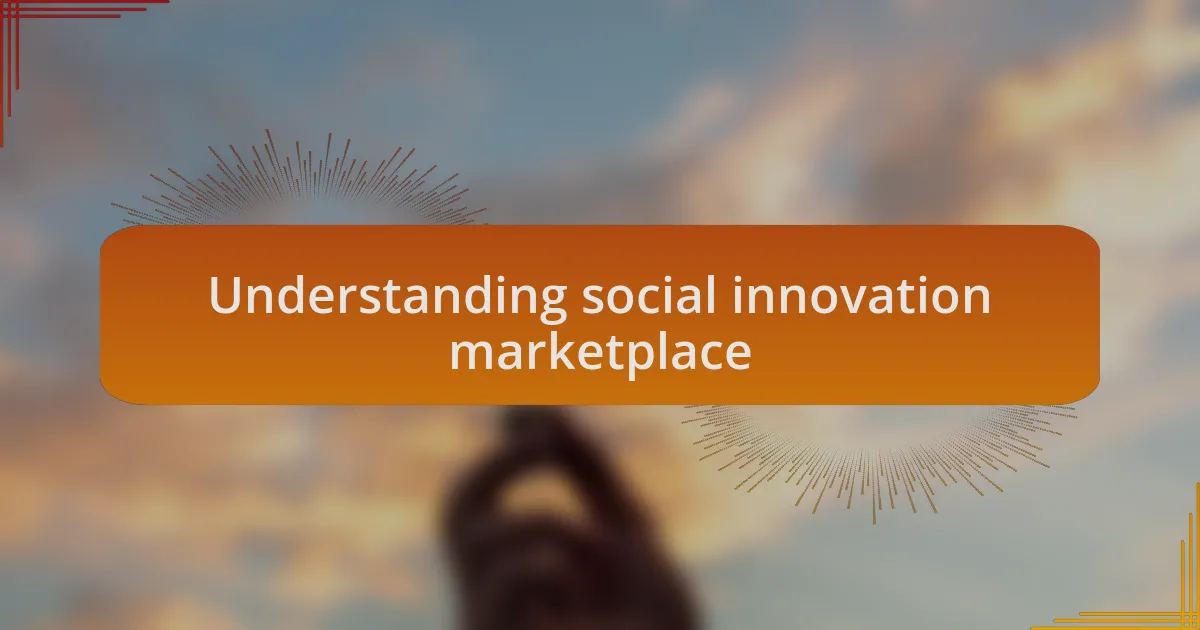
Understanding social innovation marketplace
The social innovation marketplace serves as a dynamic hub where individuals and organizations come together to address pressing social issues. I remember my first experience interacting with this marketplace; it was illuminating to see how diverse ideas could converge for a common goal. Have you ever thought about the power of collaboration in driving change? It’s fascinating how these collaborations can spark creativity and lead to solutions that a single entity might never conceive alone.
Understanding this marketplace requires recognizing its multifaceted nature. For example, I’ve seen firsthand how social enterprises tap into innovative financing solutions to scale their impact. This blend of capital and creativity draws a vivid picture of a world where profit isn’t the only bottom line—social value takes precedence. How often do we think about the financial mechanisms that underpin social initiatives? They truly create ripples that extend far beyond immediate community benefits.
Moreover, the landscape of the social innovation marketplace is ever-evolving, much like the challenges it aims to solve. One of my most memorable moments was attending a forum where a grassroots project shared its journey of overcoming systemic barriers. It made me reflect on the adaptability and resilience required in this space. Don’t you wonder what future innovations will emerge from today’s discussions? The continuous dialogue is essential for growth, pushing boundaries, and redefining success in ways we might not even fully grasp yet.
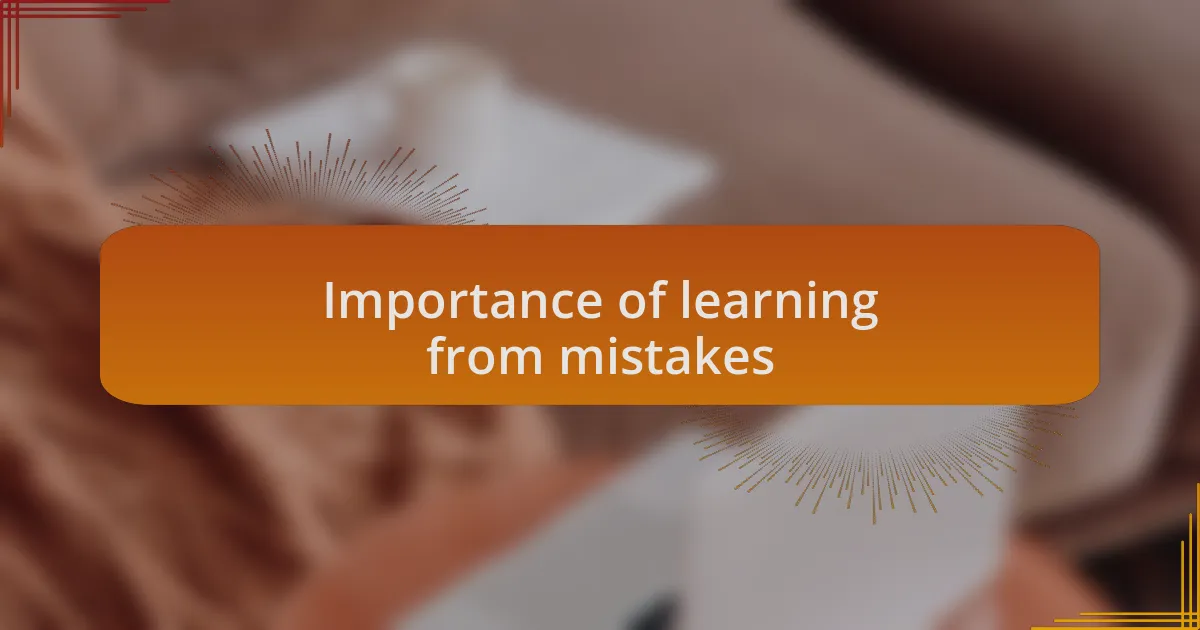
Importance of learning from mistakes
Learning from mistakes is crucial because it helps us develop resilience. I recall a project where I miscalculated the target audience’s needs. The initial failures stung, but they also forced me to dig deeper, leading to a more precise understanding that ultimately shaped the project’s success. Have you experienced a moment when failure transformed your perspective?
Mistakes also serve as valuable feedback. After a community workshop I facilitated fizzled due to poor attendance, I realized that merely promoting the event wasn’t enough. Reflecting on the situation, I recognized I needed to engage more with potential participants ahead of time. Doesn’t it make you think about all the opportunities lost simply because we didn’t pause to learn from our slip-ups?
Moreover, acknowledging our errors fosters a culture of openness and innovation. When I began sharing my setbacks with colleagues, I noticed a shift in our dynamic—people felt more empowered to take risks without fear of judgment. Isn’t it refreshing to create an environment where we can learn together rather than hide our imperfections? Embracing the lessons from mistakes not only enhances personal growth but also fuels collective creativity in the social innovation marketplace.
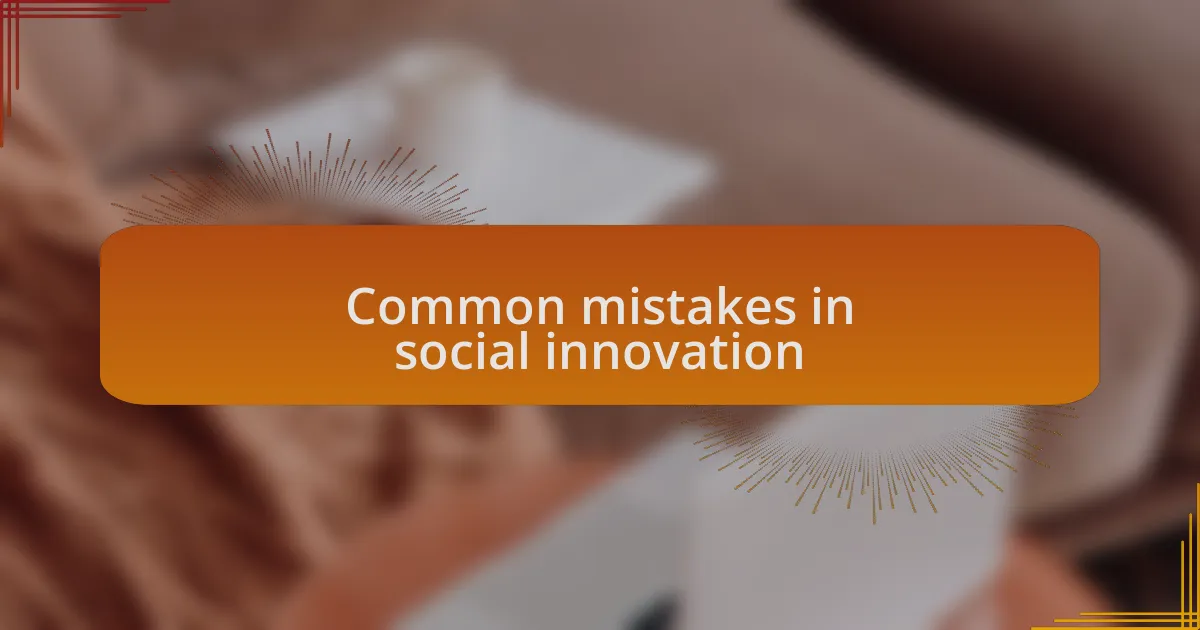
Common mistakes in social innovation
One common mistake in social innovation is failing to engage stakeholders properly. In my early days of project development, I jumped straight into implementing solutions without truly listening to community members. The result? A well-intentioned initiative that missed the mark and left me questioning my approach. Have you ever found yourself assuming you know better than those directly affected?
Another frequent misstep is not measuring impact effectively. I remember running a pilot program that felt successful based on our internal metrics, only to realize later that we hadn’t gathered feedback from participants. This oversight not only affected our credibility but also hindered any chance for meaningful improvement. How often do we rely on our assumptions instead of seeking the insights that could elevate our work?
Lastly, overlooking the importance of sustainable funding can doom a social innovation effort from the start. I’ve experienced the sobering reality of securing a project only to watch it flounder once initial grants dried up. It serves as a stark reminder: without a long-term financial strategy, even the best ideas can get lost in the shuffle. Have you thought about how you might ensure your initiatives have lasting support?
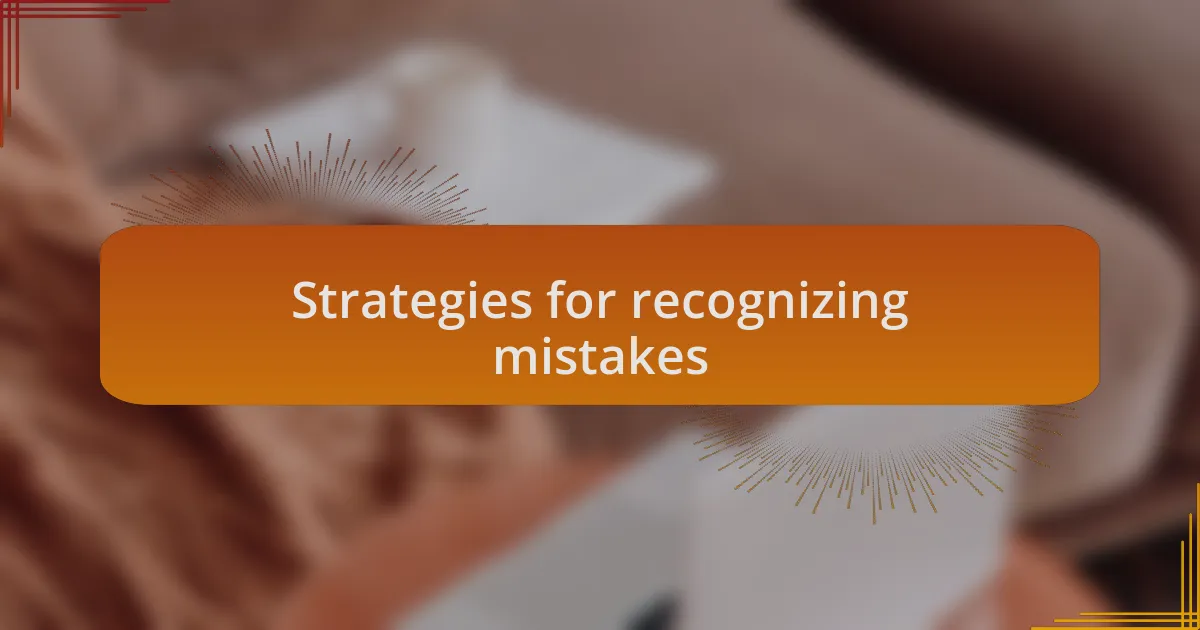
Strategies for recognizing mistakes
Recognizing our mistakes is a crucial step towards growth, and one effective strategy is cultivating self-reflection. I’ve found that setting aside time after each project to analyze what went well and what didn’t can be incredibly enlightening. When was the last time you truly reflected on the outcomes of your initiatives?
Engaging others for feedback opens up a whole new perspective. In one project, after soliciting opinions from my team and the community, I was surprised to uncover flaws that I had completely overlooked. How often do we assume we have all the answers without tapping into the collective wisdom of those around us?
Lastly, actively tracking our decisions and their outcomes can provide a roadmap for recognizing where we deviated from our goals. For instance, I started keeping a detailed journal of my project decisions and their results. This practice allowed me to identify patterns in my mistakes, making it easier to navigate future challenges. Have you considered documenting your journey to spot recurring pitfalls?
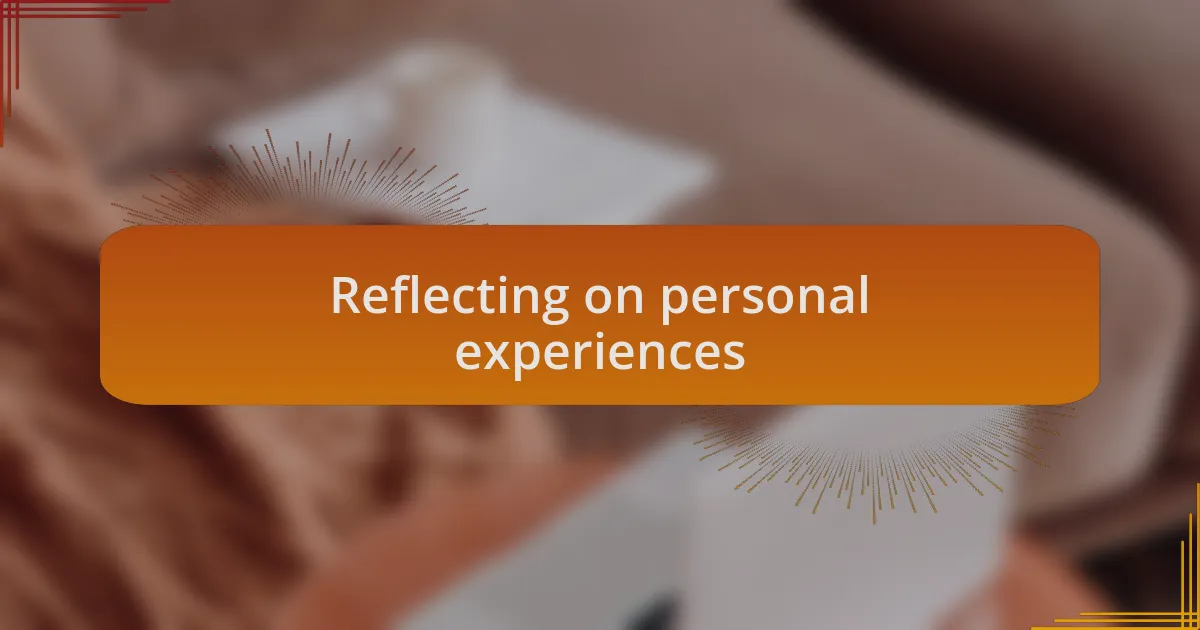
Reflecting on personal experiences
Reflecting on personal experiences often unveils lessons that remain hidden during the heat of action. I vividly remember a community initiative where I neglected to involve key stakeholders early in the process. The aftermath was frustrating, as I struggled to gain their support. Have you ever thought about how early inclusivity can shape the outcome of a project?
There was a moment when I realized the weight of my choices through a simple conversation. A teammate expressed their discontent about not being heard, and their honesty struck a chord with me. It was in that exchange that I recognized my responsibility to foster an environment where everyone felt valued. What if we prioritized open communication as a tool for collective success?
Taking time to scrutinize my experiences has transformed my approach immensely. After a particularly challenging project, I organized a debriefing session, inviting every team member to share their insights. The diverse perspectives we gathered not only highlighted my blind spots but also strengthened our collaboration moving forward. How can we ensure that every voice contributes to our journey? I’ve learned that embracing this dialogue paves the way for more inclusive and innovative solutions.
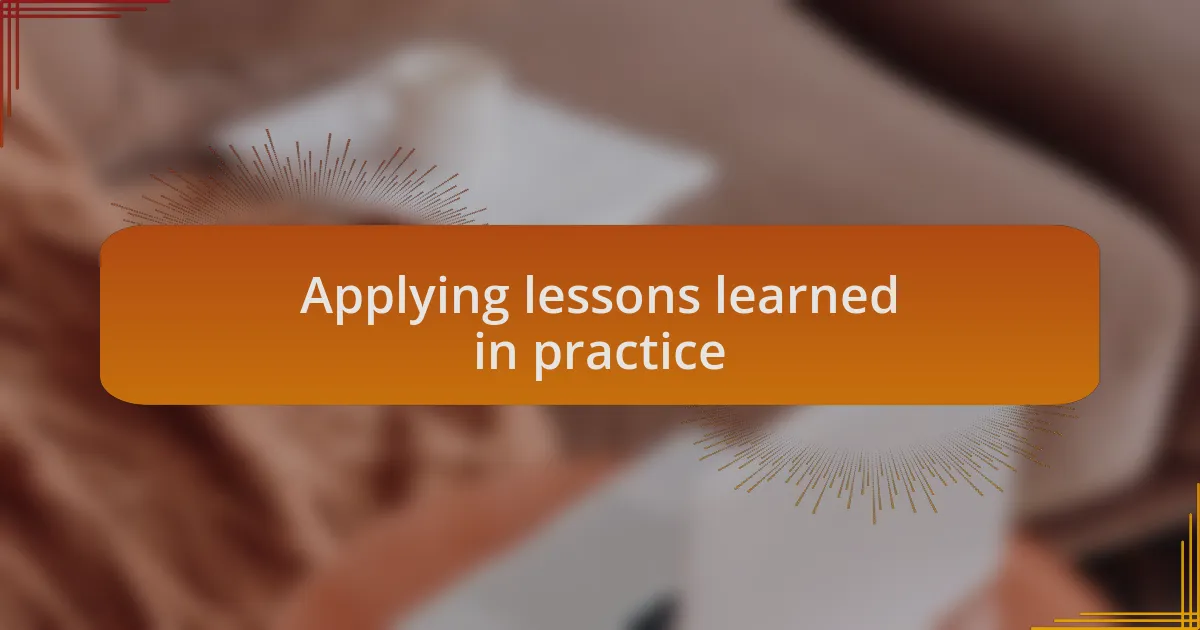
Applying lessons learned in practice
Applying lessons from past experiences requires a concerted effort to integrate these insights into future actions. I recall a social project where I overlooked the importance of continuous feedback. Initially, I pushed ahead with decisions based on my assumptions, only to find later that community needs had shifted. How many times have we let our ego blind us to vital changes around us?
One powerful takeaway that emerged from a failed fundraising effort was the necessity of adaptability. After seeing our initial strategy flop, we regrouped and sought input from community members about their preferences. This pivot not only salvaged our campaign but also showcased the value of staying responsive. How often do we underestimate the voice of our audience in shaping our strategies?
As I moved forward, I made it a personal commitment to harness those moments of pause—transforming them into actionable strategies. I implemented regular feedback loops within the teams I lead, where we openly discuss what’s working and what’s not. This practice has built a culture of accountability and shared ownership, essential elements for any social innovation endeavor. Have you considered how actively adapting based on what we’ve learned can empower better outcomes?
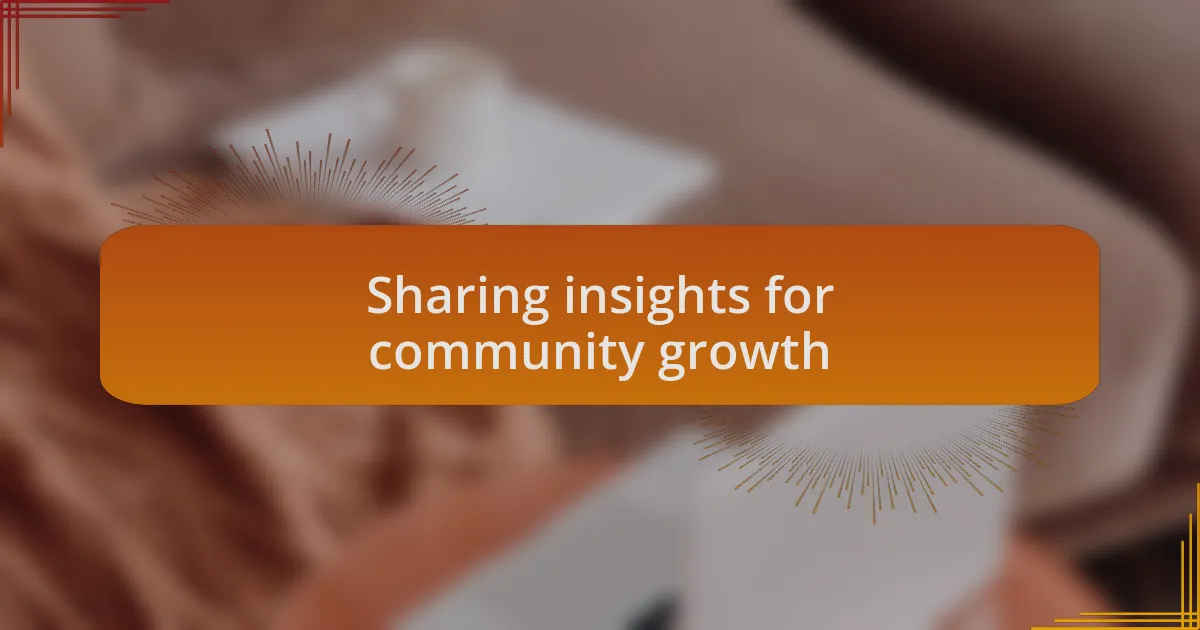
Sharing insights for community growth
Sharing insights can be a game changer for community growth. I remember a time when a colleague and I hosted a workshop to discuss our project failures. The genuine stories shared not only fostered trust among participants but also ignited a spark for collaboration that none of us had anticipated. How often do we overlook the power of collective experiences in driving our mission forward?
I’ve also seen how transparent communication shapes the culture within a community. During a project review, I boldly shared my mistakes, highlighting what went wrong and the lessons learned. Surprisingly, rather than feeling embarrassed, I felt empowered. The openness encouraged others to share their own missteps, leading to richer discussions and innovative solutions. Isn’t it fascinating how vulnerability can transform discussions into powerful learning opportunities?
Moreover, sharing failures encourages a growth mindset. After one initiative fell flat, our team organized a roundtable to identify what went awry without fear of judgment. The candid reflections revealed not just what didn’t work but also how we could evolve our approach. Each voice contributed, reshaping our next steps. Have you considered what untapped potential lies in being forthright about setbacks in your community?